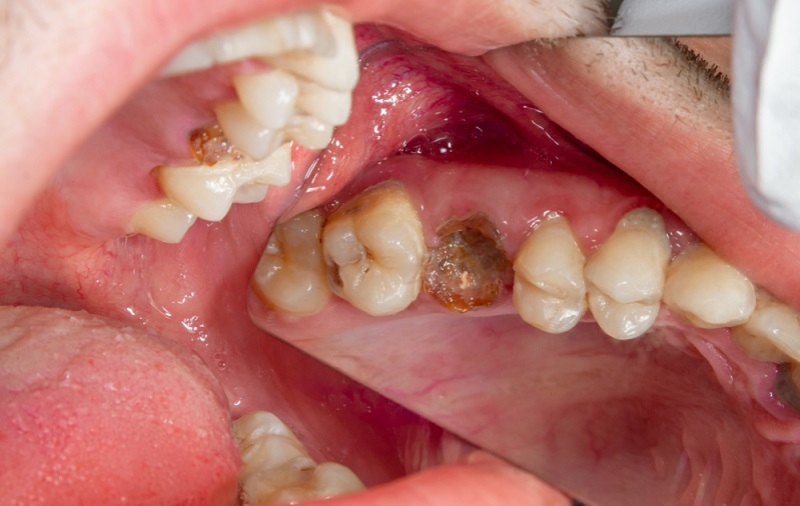How Deep Cavities Can Impact Your Career Success & Well-Being
Contents

Deep Cavities - The Silent Intruder
Understanding the root causes of dental distress is essential, as it goes beyond mere discomfort. Cavities, resulting from the gradual decay of tooth structure, penetrate beyond the enamel into deeper layers.
Workplace habits, such as consuming sugary snacks, caffeinated beverages, and stress-induced teeth grinding, create an environment ripe for deep cavities.
Impact of Deep Cavities on Workplace
Moving beyond the physical discomfort, deep cavities wield a substantial impact on workplace performance.
The distraction of persistent pain, coupled with the mental fog induced by dental discomfort, can disrupt focus, hinder productivity and compromise the quality of work.
As professionals striving for excellence, acknowledging and mitigating these impacts becomes paramount for sustained success.
Here’s an exploration of potential impacts:
1. Productivity and Focus:
Issue: Persistent tooth pain and discomfort caused by deep cavities can be distracting, making it challenging for individuals to concentrate on their work
Impact: Reduced productivity, increased errors and difficulty in maintaining focus on tasks can result in suboptimal job performance
2. Absenteeism
Issue: Severe pain or the need for frequent dental appointments can lead to increased leave of absence
Impact: Regular absences disrupt workflow, affect project timelines and can strain relationships with colleagues who may need to compensate for the absent team member.
3. Work-Related Stress
Issue: Dealing with the discomfort of deep cavities can contribute to overall stress levels.
Impact: Increased stress may affect mental well-being, potentially leading to burnout, decreased job satisfaction, and strained professional relationships.
4. Communication Challenges
Issue: Pain or sensitivity in the oral cavity, may hinder effective communication, especially in roles that require frequent interaction with colleagues, clients or the public.
Impact: Difficulties in articulating thoughts or engaging in verbal communication can hinder professional relationships and potentially impact career growth.
5. Professional Image:
Issue: Visible signs of dental distress, such as grimacing or avoiding smiling, may affect an individual's professional image.
Impact: Colleagues and superiors may perceive an individual as disengaged or unapproachable, potentially affecting teamwork and career advancement opportunities.
6. Financial Implications:
Issue: Ignoring deep cavities may lead to the need for more extensive and costly dental procedures.
Impact: Financial strain from unexpected dental expenses can add stress and may divert resources that could be allocated elsewhere.
Importance of Addressing Deep Cavities
Think of your teeth as the foundation of a building. If the foundation is compromised, the entire structure is at risk. Similarly, neglecting deep cavities can lead to serious oral health complications.
Here are some key reasons why it's crucial to address deep cavities:
1. Prevention of further damage:
Deep cavities indicate significant decay that has penetrated beyond the enamel.
Prompt intervention prevents the progression of decay, limiting the potential for more extensive damage to the tooth structure.
2. Prevention of infections:
Deep cavities expose the inner pulp of the tooth, making it vulnerable to bacterial infection, if left untreated, this can lead to abscess formation, causing severe pain and increasing the risk of systemic infections that can impact overall health. It can also reduce the risk of developing gum disease.
3. Pain management:
Deep cavities often cause persistent and intense toothache. Addressing the cavity alleviates this pain, improving the individual’s quality of life and overall comfort.
4. Preservation of natural teeth:
Timely treatment, especially through procedures like root canals, focuses on preserving the natural tooth structure.
This is crucial for maintaining proper oral function, and aesthetics and preventing the need for tooth extraction.
5. Avoidance of tooth loss:
Unchecked deep cavities can lead to irreversible damage, ultimately resulting in tooth loss.
Preserving natural teeth is not only essential for oral function but also contributes to maintaining facial structure, and preventing issues like jawbone loss.
6. Cost-effective long term:
Early intervention can be more cost-effective in the long run. Delaying treatment may lead to more complex and expensive dental procedures, such as tooth extraction and replacement with prosthetics.
Deep Cavity Treatment Options
The most common treatment options include:
1. Dental Filling and Crowns
Dental fillings involve removing the decayed portion of the tooth and filling the cavity with a restorative material such as amalgam or composite resin.
Dental crowns are tooth-shaped caps that cover the visible portion of the damaged tooth.
2. Inlays and Onlays
Inlays and Onlays are custom-made restorations that fit into or onto the prepared cavity, respectively.
They are often used when the damage is too extensive for a filling but not enough to warrant a full crown.
3. Root Canal Treatment
Root canal addresses the root cause (pun intended) of the issue, providing a comprehensive solution that goes beyond the surface-level fixes.
It is not just about immediate relief, it ensures the longevity of your natural tooth and prevents future dental problems.
With modern anaesthesia and advanced techniques, discomfort during this procedure is minimal.
A root canal procedure actually strengthens and preserves the tooth, preventing the need for extraction.
4. Dental Implants
In cases where a tooth is severely damaged or needs extraction, dental implants can replace the missing tooth.
This involves placing an artificial tooth root (implant) into the jawbone and attaching a crown on top.
5. Tooth Extraction
When a tooth cannot be saved through other treatments, extraction might be recommended.
6. Preventive Treatments
Fluoride treatments and dental sealants can be applied to prevent further decay and protect vulnerable areas of the teeth.
Conclusion
There is a ripple effect of addressing oral health in the workplace. Imagine this: you walk into a meeting, and instead of hiding your discomfort behind a forced smile, you confidently contribute to the discussion.
Your dental health is not just about teeth; it's about the aura you bring to the workplace.
Good oral health contributes to self-esteem and success. It's the secret weapon that empowers you to navigate workplace challenges with a smile, knowing that your dental fortress is standing strong.

